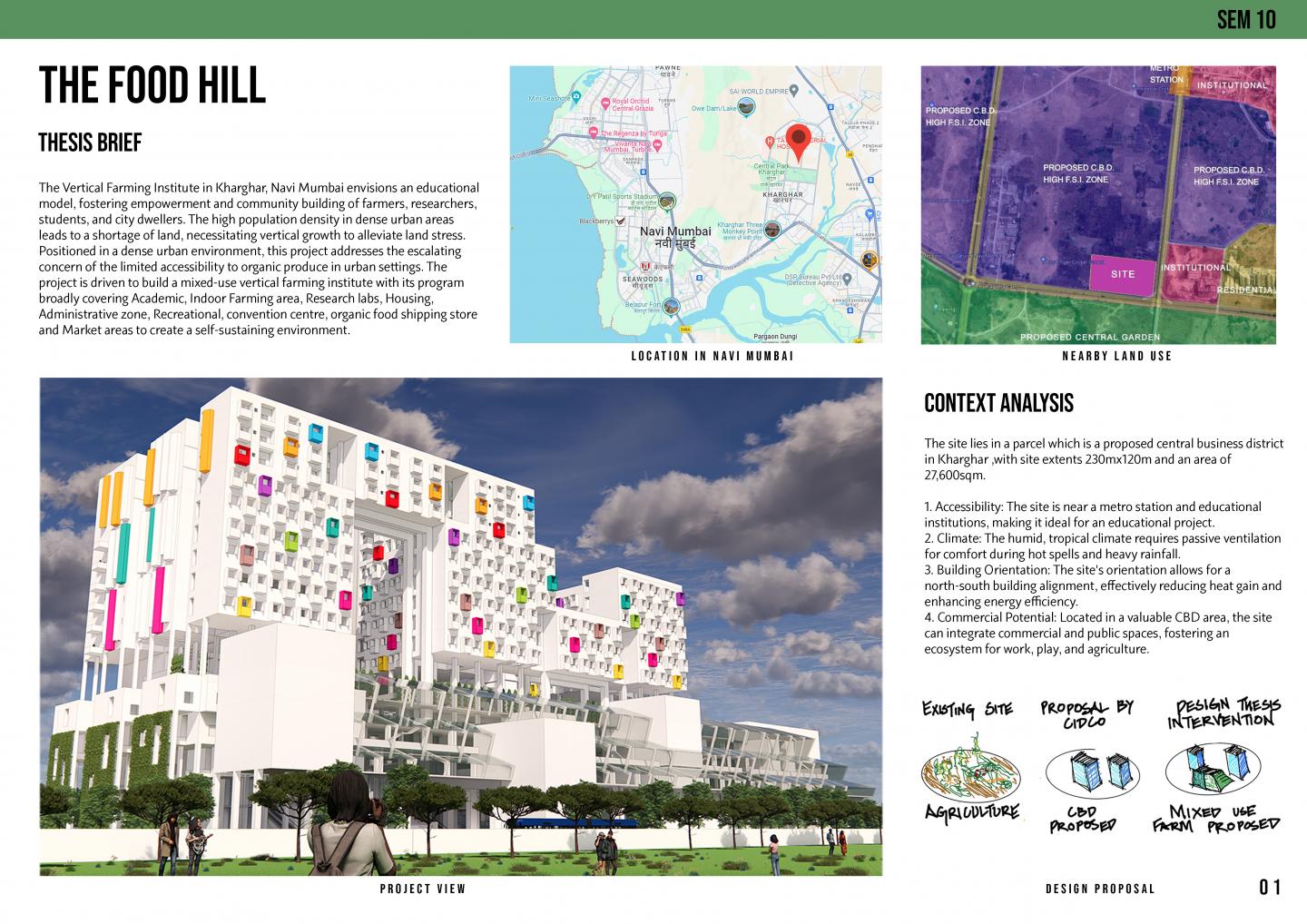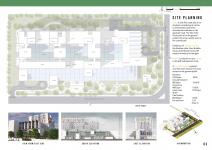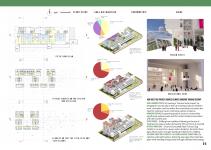Vertical Farming Institute - Reconnecting Urban Life with Agriculture in Navi Mumbai
The Food Hill, A Vertical Farming Institute in Kharghar, Navi Mumbai, reimagines the relationship between city living and agriculture. In a dense urban landscape, this project transcends the idea of a typical vertical farm; it merges education, sustainability, and community into a dynamic hub that fosters a healthier urban lifestyle. This institute blurs the lines between learning, living, and farming, encouraging a future where sustainability is at the forefront of urban existence.
Navi Mumbai’s rapid growth has pushed agriculture out of sight, increasing reliance on transported food. The Vertical Farming Institute addresses this gap, bringing fresh, locally grown produce back to city residents. It aims to provide food and reconnect people with the origins of what they eat.
Designing for Community and Accessibility
More than just a vertical farm, the institute is a mixed-use space that includes academic areas, indoor farms, research labs, housing, and public markets. By integrating these elements, the design creates a vibrant community hub. Public spaces at the ground level feature markets where locals can buy fresh produce directly from the farm, transforming agriculture into an accessible part of daily life.
The institute also includes recreational areas and workspaces, fostering a sense of belonging where learning, leisure and livelihood intersect. This integration invites city dwellers to engage with agriculture as part of their everyday experience, enhancing their connection to food production.
Research-Driven Design for Social and Environmental Impact
The institute’s site selection in Kharghar, close to educational institutions and a metro station, enhances accessibility for students and the public alike. This strategic location supports the goal of creating a community-oriented agricultural hub.
Climate considerations informed the design process, prioritizing passive cooling strategies to combat Kharghar’s warm, humid climate. The building is oriented to reduce heat gain and maintain comfort with minimal energy use. Hydroponics is utilized in farming systems, significantly reducing water demand by 95% and recycling water efficiently. This approach establishes the institute as a model for sustainable farming in urban settings.
Commitment to Sustainability in Materials and Energy
To minimize its environmental footprint, the institute incorporates sustainable materials, such as Ground-Granulated Blast-Furnace Slag (GGBS) in concrete to lower carbon emissions and bio-bricks made from agricultural waste. These choices reflect a commitment to a circular economy, transforming waste into valuable resources.
The rooftop features solar panels that capture sunlight at an optimal angle, generating energy to meet the institute’s needs while minimizing glare. The energy produced is redistributed throughout the building, enhancing self-sufficiency. Every aspect of the design emphasizes efficiency and sustainability, positioning the institute as a leader in urban agricultural architecture.
A Vision for Future-Proof Urban Design
At the core of the Vertical Farming Institute is a fundamental question: how can spaces serve both community and environment? The answer lies in creating a place for people to connect, share, and learn. This institute envisions a future where urban spaces harmonize with nature, fostering vibrant ecosystems that support sustainable living.
The research process involved gathering insights from farmers, environmental experts, and urban planners. This collaborative approach ensured the design stayed rooted in the land and the community’s needs. The result is a space where agriculture and urban life intertwine, benefiting everyone involved.
Cultivating Community and a Greener Future
The Vertical Farming Institute redefines urban spaces, reconnecting residents with agriculture and the environment. It provides fresh produce while inspiring new ideas about how cities can support sustainable food systems. By reducing food miles and promoting water conservation, the institute serves as a living example of a sustainable urban future.
More than just a building, the Vertical Farming Institute embodies the idea that cities and agriculture can thrive together. It shows that thoughtful design can turn urban spaces into educational, ecological, and social resources, where sustainable practices flourish alongside human connections. In this way, the project aims to cultivate crops, knowledge, community, and a shared commitment to a better future.
2024
Site Location Pin 19° 3'28.77"N 73° 4'34.28"E
Rajvir Singh
Dr Karamjit Singh Chahal (Thesis Co-guide)
Dr Rawal Singh Aulakh (Thesis Co-Guide)






